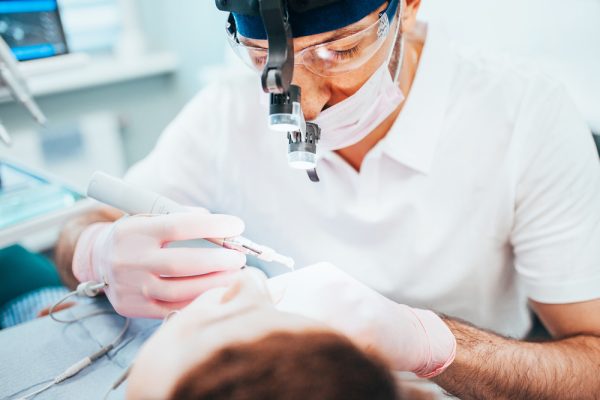Are You Looking for a Periodontist?
We understand the struggles of finding a local dentist or a dentist that works with you to meet your needs. If you have periodontal disease and are looking for a specialist, we’ve got you covered. Our Seattle, WA, dental professionals have created a comprehensive guide to help you find the best periodontist so you can get your oral health back on track.
What Is a Periodontist?
A periodontist is a dental specialist who focuses on the prevention, diagnosis, and treatment of periodontal disease, which is an infection of the gums and other tissues that support the teeth. Periodontists also perform various surgical procedures, including gum grafting, bone grafting, and dental implant placement.
How to Become a Periodontist
Becoming a periodontist requires a bit more than traditional dental school training. Periodontists should have done the following:
- Obtain a Bachelor’s Degree
- Take the Dental Admission Test (DAT)
- Attend Dental School
- Obtain a Dental License
- Complete a Periodontics Residency
- Obtain Specialty Certification
- Continue Learning and Stay Updated

Finding a Periodontist Near You
If you’re looking for a periodontist near you, you want to find someone highly skilled in treating gum diseases who can provide you with comprehensive care. Periodontics is a specialized field, and not all dentists have the same level of expertise in this area. Not everyone has the same needs, finances, or health status to be able to go to the first dentist they find.
When to See a Periodontist
Seeing a periodontist is crucial for maintaining optimal oral and gum health, especially when dealing with patients with periodontal issues. Your general dentist may recommend visiting a periodontist for several reasons.:
- Specialized Expertise: Periodontists are dental specialists who receive extensive training in the prevention, diagnosis, and treatment of periodontal diseases. They have in-depth knowledge of the supporting structures of the teeth, including the gums, jawbone, and connective tissues.
- Diagnosis and Treatment of Gum Diseases: Periodontists are trained in diagnosing and treating various gum diseases, such as gingivitis and periodontitis. They can accurately assess the severity of the condition, identify the underlying causes, and develop a personalized treatment plan.
- Dental Implant Expertise: If you’re considering dental implants as a solution for missing teeth, consulting a periodontist is essential. Periodontists have advanced training and experience in implant placement and the surrounding oral tissues. They can evaluate your suitability for dental implants, ensure proper implant integration with the jawbone, and design a customized treatment plan that meets your specific needs.
- Periodontal Surgery and Interventions: In cases where gum diseases have progressed to an advanced stage or require surgical intervention, periodontists are highly skilled in performing various surgical procedures. These may include scaling and root planing, gum grafting, pocket reduction surgery, and bone regeneration procedures.
- Long-Term Oral Health Management: Periodontists not only focus on treating existing gum problems but also emphasize long-term oral health management. They can guide proper oral hygiene practices, offer preventive treatments to maintain healthy gums, and monitor your condition over time to prevent the recurrence of gum diseases.
Treatments Offered by Periodontists
Periodontists offer a range of treatments to address various periodontal conditions. Some common treatments offered by periodontists include:
- Scaling and Root Planing: This non-surgical procedure involves deep cleaning of the teeth and root surfaces to remove plaque, tartar, and bacteria from below the gumline. It is typically performed to treat gum disease (periodontitis) and helps in reducing inflammation and promoting gum tissue healing.
- Periodontal Surgery: Periodontists are skilled in performing surgical procedures to treat advanced gum disease or correct gum and bone issues. Some common surgical procedures include pocket reduction surgery (gingivectomy or flap surgery), gum grafting, bone grafting, and guided tissue regeneration.
- Dental Implant Placement: Periodontists are experienced in the placement of dental implants, which are artificial tooth roots used to replace missing teeth. They evaluate the jawbone condition, plan the implant placement, and perform the surgical procedure to insert the implants into the jawbone to address tooth loss.
- Gum Grafting: Periodontists may perform gum grafting procedures to restore and repair receding gums. During this procedure, tissue is taken from another part of the mouth (such as the palate) or a donor source and is grafted onto the area with receding gums to improve the gumline’s appearance and protect the tooth roots.
- Crown Lengthening: This procedure is done to expose more of the tooth structure when the tooth is partially covered by excessive gum tissue. Periodontists perform crown lengthening to treat a “gummy smile” or to create enough space for a dental restoration, such as a crown or bridge.
- Dental Crown Lengthening: Periodontists can perform crown lengthening procedures to expose more of the tooth structure if a tooth is broken, decayed, or too short to support a dental crown. The procedure involves removing gum tissue and, if necessary, reshaping the underlying bone to expose more of the tooth.
- Maintenance and Follow-up Care: Periodontists provide ongoing maintenance and follow-up care for patients with periodontal diseases or those who have undergone periodontal treatments. This may include regular check-ups, cleanings, monitoring gum health, and providing guidance on oral hygiene practices.

What to Consider When Looking for a Periodontist
When choosing a periodontist near Seattle, WA, there are several factors to consider.
Ask Your Dentist
While you can usually see a periodontist without a referral, asking your dentist for a recommendation is usually the best way to find an experienced provider. Your dentist acts as the first line of defense when it comes to treating minor tooth decay and gum disease issues, but if it progresses, they’ll likely recommend visiting a periodontist.
Credentials and Experience
Look for a dentist who has specialized training in periodontics with years of experience in treating gum diseases. They should have also obtained a 4-year degree and completed dental school. Look for a periodontist who is board-certified and a member of the American Dental Association and the American Academy of Periodontology.
Dental Association Directories
Visit the website of the American Academy of Periodontology (AAP) or the Washington State Dental Association (WSDA). They usually provide directories or search tools to help you find periodontists in Seattle or your desired area. These directories often include contact information, office locations, and additional details.
Reputation
Try the search phase “periodontist near me” to check for local dentists and find online reviews. You can also ask for referrals from friends or family members who have had past periodontal treatment from a specific periodontist.
Technology and Equipment
A periodontal dentist should have state-of-the-art equipment and technology to provide the most effective treatment. The last thing you want to see is a periodontics doctor using out-of-date technology or treatment methods. You can ask whether your doctor uses laser gum treatment, 3D imaging, and digital X-rays.
Insurance and Financing
Check to see if the office of the periodontist accepts your insurance plan and if they offer financing options for out-of-pocket expenses. You can contact your insurance company to review your options.
Frequently Asked Questions
It’s recommended to see a periodontist for an evaluation and treatment plan if you have symptoms of gum disease or if you have a family history of periodontal disease. Regular visits to a dentist for cleanings and checkups can also help prevent gum disease and catch it early.
The primary focus of the periodontist is to prevent the development of periodontal disease (gum disease), diagnose issues impacting the mouth, gums, and jawbone, and provide treatment for conditions such as gingivitis, periodontitis, and bone loss.
During a routine dental checkup, if a general dentist or dental hygienist identifies signs of gingivitis or rapidly progressing periodontal disease, they may suggest seeking a consultation with a periodontist. However, it’s important to note that a referral isn’t always required for a periodontal consultation.
Secure Your Smile Today: Find Your Trusted Dentist in Seattle, WA!
Are you tired of hiding your smile because of dental issues? Don’t let fear or lack of information hold you back from achieving a healthy, confident smile. It’s time to take action and find a trusted dentist in Seattle, WA, who can provide you with the care and support you need.
Our experienced dental team is dedicated to helping you achieve optimal oral health and a beautiful smile that you can be proud of. Whether you need a routine check-up, cosmetic dentistry procedure, or emergency dental care, we are here to help. Don’t wait any longer to take care of your dental needs. Contact us today!

